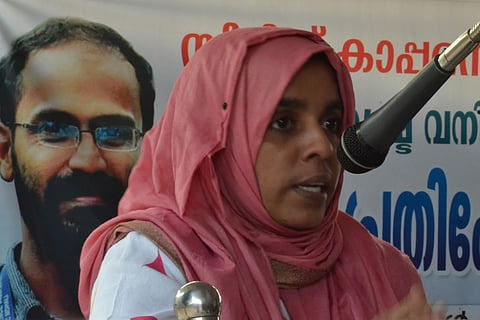

On International Women’s Day, hundreds of women, especially from the Muslim comminuty, gathered in Kerala’s Malappuram district demanding the release of independent journalist Siddique Kappan, who was arrested by the Uttar Pradesh police last October while he was on his way to the house of the Dalit woman in Hathras who was allegedly gang raped and killed by four dominant caste men. The meeting was held in his hometown of Vengara. Inaugurating the meeting, Vengara panchayat president KP Haseena Fasal said that both the state and the Union governments were facilitating the incarceration of the journalist.
“The fact that Siddique Kappan went to Hathras to report on the background of the caste rape by Thakurs and the institutional murder of a 19-year-old Dalit girl must be stressed,” said Ambika, a senior journalist, editor of Maruvakku monthly, and executive member of the Siddique Kappan Solidarity Committee. The committee has been organising protest meetings in many districts. From addressing it as only suppression of press freedom and as a case framed on an independent journalist, the women’s protest highlighted how the casteist, hegemonic institutions are failing Dalit, Muslim, Bahujan, Adivasi women every day.
Kannamangalam panchayat vice-president Haseena, Malappuram district panchayat member Sameera Pulikkal, former Vengara panchayat member Sarojini, state committee member of the National Women’s Front (NWF) Habeeba Usman, Women India Movement constituency president Arifa, Welfare Party state vice-president EC Aysha and others spoke about the case, and demanded the immediate release of Siddique Kappan. The women spoke about how the potential of feminist assertion is systematically suppressed and how women carry the fight forward amidst severe challenges.
Haseena Fasal speaking at the protest
“The government is imprisoning those who dissent. It was only recently that 4G internet was restored in Kashmir. When we read the news, we think is this happening in India? For journalists, it goes beyond that, they are capable of questioning the crimes that are happening. The role of journalists in reshaping democratic structures is vital. Their work has contributed immensely to the system, including bureaucracy and judiciary. But for the past five years, journalists in India are facing multitudes of attacks, including framed cases and murder,” said Sameera Pulikkal.
Ambika remarked that Kerala Chief Minister Pinarayi Vijayan excused himself from intervening in Siddique Kappan’s arrest whereas he had quickly intervened in the arrest of BDJS leader Thushar Vellappally. Most of the speakers also criticised the state government for acting on the lines of the Union government in handling cases of rape and murder in the state.
“The mother of the two Dalit girls who were raped and then murdered in Walayar is starting a Neeti Yatra demanding action against the police officers who fudged the case since the beginning. While this is happening right in front of our eyes, the Kerala CM’s Women’s Day message is completely misleading,” Ambika said.
Prof Haripriya, a feminist activist who works at Manjeri NSS College, said that women are asking direct questions to the judiciary regarding the growing intolerance by communal forces that are governing the country.
“Siddique is not just another journalist. He is the secretary of the Kerala Union of working Journalists (KUWJ), Delhi. This country is built from the relentless work of journalists. Previous prime ministers used to accept criticism, Narendra Modi’s intolerance towards journalists is worrisome,” she said. How can the state look at the arrest of a citizen with indifference, she questioned the Kerala government.
“Siddique Kappan, who had been working in Delhi for the past eight years, is my husband. He is a journalist to the core and what the UP police are accusing him of is not true,” said Raihanath, Siddique Kappan’s wife.
“He is a journalist who always wanted to reveal the truth and was honest in his reporting. I’m proud of what he is doing. He went to Hathras to report on the rape followed by murder of a Dalit girl, when very few journalists dared to go. When did journalism become a seditious act? What crime did my husband do? His three children, wife and mother are awaiting him. I’m unemployed. I was not used to going out, but now I have to. These days I’m praying for the families of thousands of prisoners who are innocent. I place my trust in the Supreme Court and expect not his bail, but acquittal. KUWJ is with me. I’m thankful to the Siddique Kappan Solidarity Committee for keeping me sane whenever I fall,” Raihanath concluded.
The next hearing in Siddique Kappan’s case was supposed to be held on Tuesday, but it wasn’t listed for the day.
Mrudula Bhavani is an independent journalist based in Kerala.